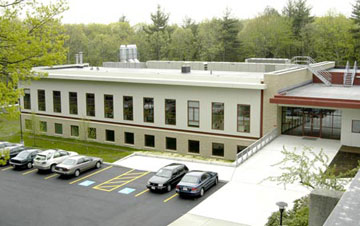Regina McEneryIAVI
Regina McEnery is a science writer at the International AIDS Vaccine Initiative, a nonprofit working to develop preventative AIDS vaccines that are safe, effective, and accessible to all people.
In this guest post, Regina McEnery from IAVI Report writes about the planned closure of the New England Primate Research Center and its effects on the community of HIV researchers who conduct primate studies.
As animal facilities go, the New England Primate Research Center (NEPRC) had attained a legendary status on the roster of US biomedical research institutions. A good number of important discoveries have been made within its walls in the half century it has been around. Researchers working there generated some of the earliest evidence that AIDS is a viral disease, and subsequently discovered the simian immunodeficiency virus (SIV), which causes the monkey version of AIDS. It was there, as well, that scientists demonstrated that a vaccine can prevent the transmission of SIV, suggesting that an HIV vaccine is possible. Nor were the NEPRC’s contributions to science confined to HIV and AIDS. The facility has hosted research of profound relevance to everything from cancer to neurological disease and addiction.
But lately it had become increasingly clear that this storied institution’s best days were behind it—so far behind it, in fact, that the Harvard Medical School (HMS), which oversees the center, decided it should be shut down. Its decline was slow and fueled largely by management and money problems, rather than the quality of its research. The NEPRC has, for example, been cited at least four times since 2010 by the US Department of Agriculture (USDA) for failure to comply with the requirements of the Animal Control Act. The most recent citation, issued last year, related to a cotton-top tamarin found dehydrated after an employee neglected to provide sufficient water to the squirrel-sized monkey. After examining its recent health history, the NEPRC veterinarian decided to euthanize the monkey, according to the USDA report.

John Harding, acting director of the Division of Comparative Medicine within the Office of Research Infrastructure Programs (ORIP)—the National Institutes of Health arm that provides the core grants for all national primate research centers—notes that it is “ very uncommon to find violations of the sort where animals died.”
Still, HMS’s decision to wind down the facility by 2015 has upset the close-knit community of primate researchers. “We were all shocked,” says Ron Veazey, a professor of pathology at the Tulane National Primate Research Center in Louisiana. “Very few people can say, ‘we saw this coming.’ In an ideal world, all those [NEPRC] investigators will be able to transfer projects to other primate centers and everything will go on. But we can’t be sure.”
The NEPRC decision to phase out its research also raises serious questions about the future of the approximately 130 projects it hosts—many of which relate to AIDS. Ditto for the 2,000 or so primates housed at the facility in Southborough, MA. The closure is likely to be widely felt throughout the field of HIV research, especially in the areas of vaccine and drug development. “Literally every class of HIV drug, with the exception of protease inhibitors, was first tested in monkeys,” noted Veazey.
Louis Picker, a professor of pathology/molecular microbiology and immunology affiliated with the Oregon National Primate Research Center, says he was upset by the decision to shut down the NEPRC—where he did research during his laboratory and pathology medicine residency at Beth Israel Deaconess Medical Center in Boston. But he wasn’t surprised. “You could see the writing on the wall when this first started, two to three years ago, with the mishandling of the animal issues.”
Picker says that Harvard’s response to the animal care issues—replacing NEPRC director Ron Desrosiers and two on-site veterinarians—served to drive investigators away rather than fix the problem. HMS, however, did not single out the animal care issues in explaining its decision. In evaluating its long-term needs, HMS says, it concluded that closing NEPRC would be more beneficial and efficient than pouring more resources into maintaining and renewing its supporting grant.
“We were surprised,” says Harding. Yet Harvard’s decision, he says, should not be viewed as a signal that interest in funding nonhuman primate research is waning. “In fact, we see a continued need for this.” If anything, says Harding, the recent termination of the large HVTN 505 trial suggests more nonhuman primate research is needed.
Still, even researchers personally unaffected by the closure of the NEPRC find its disappearance from the HIV research map hard to take in. “Personally, I see it as a loss for Harvard and for the New England research committee,” said Ana Aldovini, a scientist at Boston Children’s Hospital who once used the NEPRC, but now collaborates with Tulane. “I can’t imagine it not being a loss.”
A longer version of this article is available at www.iavireport.org.